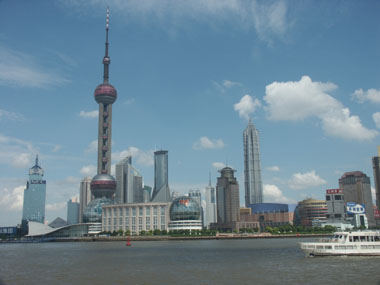202: The mining boom, powerful economic forces and Norway property focus
07-01-2008
This special report explores opportunities real estate opportunities following the boom in the mining sector, and describes some powerful economic forces at work which will shift massive financial wealth from the West, to the Middle East and Far East. We end with a focus on Norway - a safe property heaven in this time of economic challenge.
Mining Property Boom
As
·
·
·
· Russia
·
·
· Democratic
· Sierra Leone (high risk, diamonds)
· Canada (oil sands open cast extraction)
· Indonesia
· Zimbabwe (high risk)
· USA (coal in Wyoming, low risk)
·
Out of these Russia and Kazakhstan are also rich in oil and gas and to a lesser  extent Australia is also. South Africa has no significant oil or gas, but is very rich in minerals – however, the government recently cut off electric power to the mines in January due to power shortages which reduced mining GDP by -22% - risks have therefore increased and inflation is now over 10%. For a pure mining real estate play,
extent Australia is also. South Africa has no significant oil or gas, but is very rich in minerals – however, the government recently cut off electric power to the mines in January due to power shortages which reduced mining GDP by -22% - risks have therefore increased and inflation is now over 10%. For a pure mining real estate play,
For a booming city with a stable economy, mineral wealth, oil and gas wealth and general exposure to Asia Pacific’s booming economy, Perth is a place to consider, albeit it is very remote. Many oil, gas, LNG companies and successful mining companies have their offices in
Powerful Global Economic Forces At Work
Our analysis of oil and gas imports-exports suggest a massive transfer of wealth in future years from oil importing nations to oil exporting nations. The dollar is likely to continue it’s slide and asset prices in western countries are likely to drop. This will provide conditions for Middle Eastern oil wealth to be re-invested into low priced dollar and UK pound denominated assets such as commercial property, busines ses, infra-structure and residential property. In general the Middle Eastern, Russian and Far Eastern economies will inflate – whilst the western oil importing nations will deflate. Banks may well go bust in the west as write-downs and lack of credit begin to bite. How long this process lasts and how severe it will be is very difficult to judge – part of it depends on how high the oil prices go – high cost of oil imports acts like a huge tax on energy importing nations. Economic balance will shift further to China, India, Middle East and Russia – and away from Europe and
ses, infra-structure and residential property. In general the Middle Eastern, Russian and Far Eastern economies will inflate – whilst the western oil importing nations will deflate. Banks may well go bust in the west as write-downs and lack of credit begin to bite. How long this process lasts and how severe it will be is very difficult to judge – part of it depends on how high the oil prices go – high cost of oil imports acts like a huge tax on energy importing nations. Economic balance will shift further to China, India, Middle East and Russia – and away from Europe and
For Europeans who have been living off debit, rising house prices and the seeming never ending growth period – particularly in the UK – tough times lie ahead. The amount of air travel to foreign locations is likely to drop, with it the holiday home markets in place like Portugal, Greece and Italy – possibly  jobs and business relying on ultra-low priced air travel will suffer –
jobs and business relying on ultra-low priced air travel will suffer –
Property prices are likely to stay firmer in Nordic countries that have efficient industry, knowledge based economies and many high paid jobs with relatively low unemployment – also with better demographics and less of an aging population. Some of our favourite locations are London, Oslo, Luxembourg, Aberdeen, St Petersburg and Moscow.
As Italy and possibly Greece and Portugal slip towards recession, there will be pressures building to reduce Euro interest rates. However, because EU inflation is running at 4% and driven by high energy prices and growth in Germany and France, the European Central Bank is likely to INCREASE rates – sending the peripheral EU economies further towards recession. In a year or so, if oil prices stay high – which we expect – this could eventually lead to the break-up of the Euro currency – as Italy, Greece and Portugal split then deflate their currencies to stimulate business, growth and competitiveness. If they keep pegged to a Franco-German Euro dominated Euro, they will likely slip into recession if oil prices surpass $150/bbl. Hence if oil price rise above $150/bbl we predict Italy to be the first to break away from the Euro – possibly in 2010.
Let’s take a look at Norway. This cold and rainy northern outpost! The population is 5 million. We predict oil and gas revenues will top $200 billion a year by 2009 – massive. That’s $40,000 per person per annum. Meanwhile inflation is moderate, currency is strong (hardly surprising with high oil prices), and the Norwegians have been investing their oil wealth for years internationally in high earning investments. The trade balance is massively positive. The population is stable. No problems with immigration, emigration, asylum seekers etc. Politically very stable democracy. Highly educated workforce. Efficient working practices. Trusting and honest people. Very high on transparency and business ethics. Good legal framework. Many good engineers. Beautiful scenery. Long
per annum. Meanwhile inflation is moderate, currency is strong (hardly surprising with high oil prices), and the Norwegians have been investing their oil wealth for years internationally in high earning investments. The trade balance is massively positive. The population is stable. No problems with immigration, emigration, asylum seekers etc. Politically very stable democracy. Highly educated workforce. Efficient working practices. Trusting and honest people. Very high on transparency and business ethics. Good legal framework. Many good engineers. Beautiful scenery. Long
Our favoured locations are:
·
·
·
· Southern coastal seaside resorts SW of Oslo – 2nd homes for increasingly rich Norwegians
If you like long distance skiing, the northern lights (Santa for the kids) – the place is also a winner in the winter. In the summer, 20 hours of daylight, skinny dipping in the Fjords and the staggeringly beautiful scenery are all plusses. Good healthy outdoor life. We really cannot think of anything particularly negative about Norway – you’ve got to break into the relatively introvert family oriented cultural persona and social circles. It’s got

